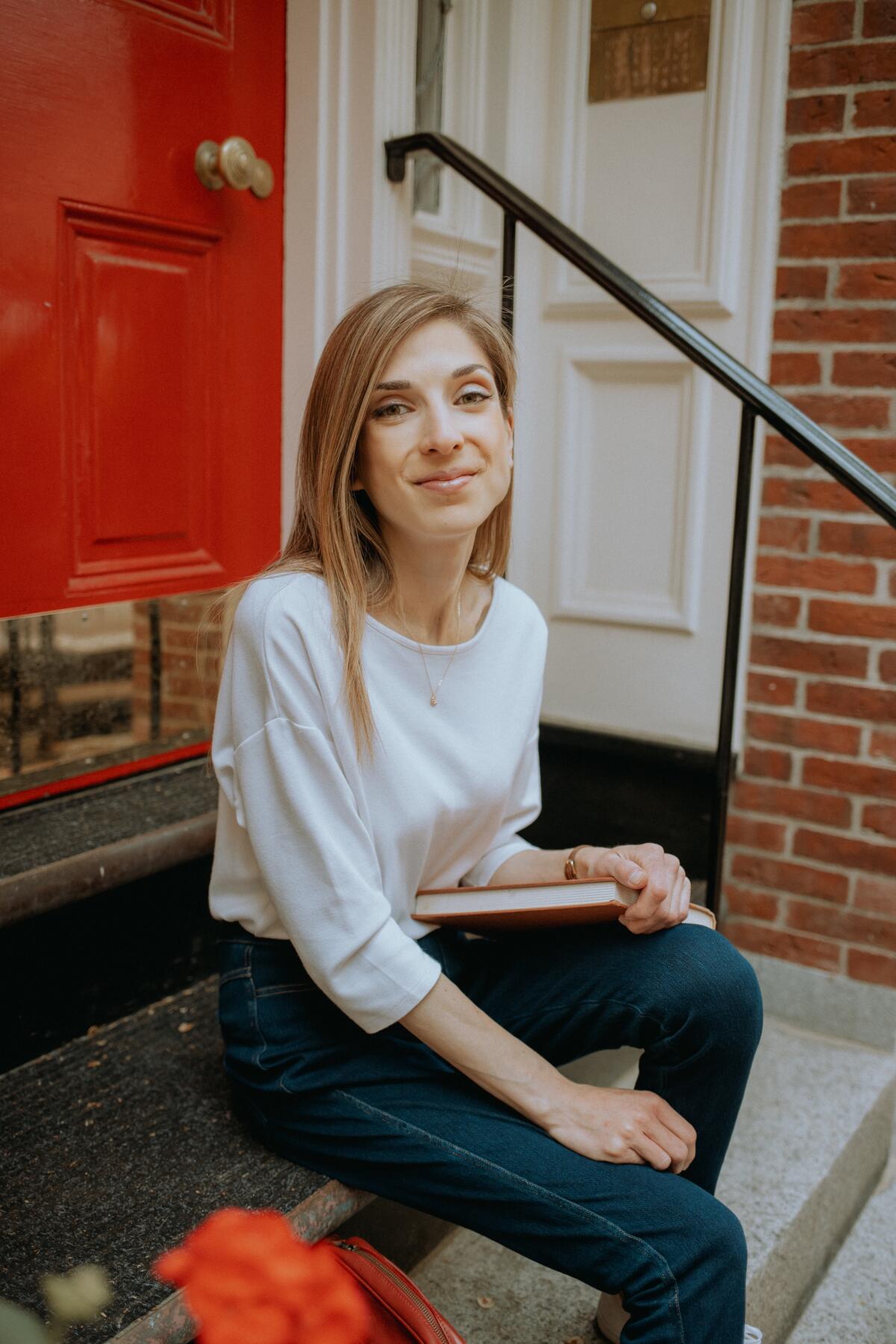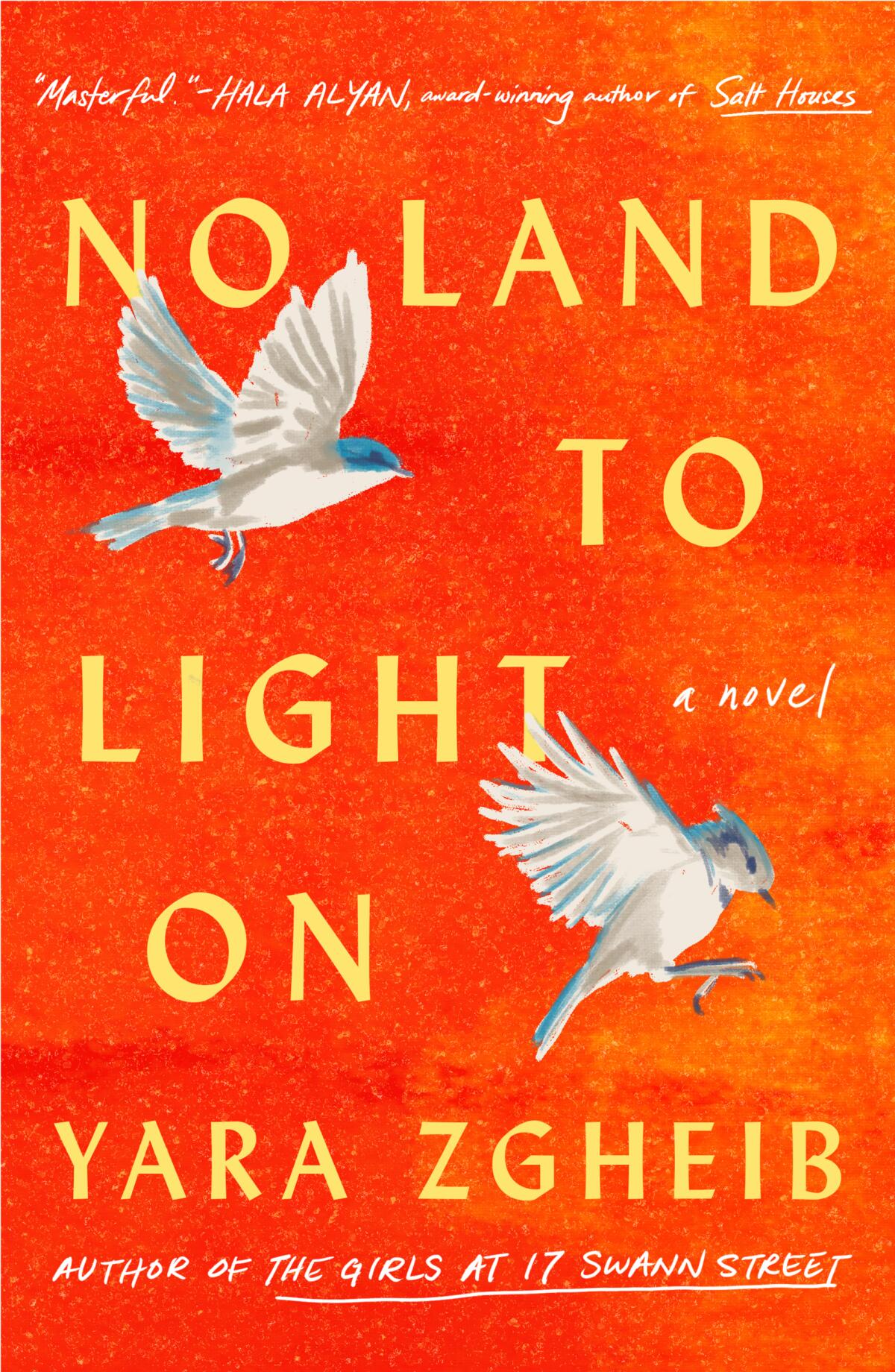Review: Trump’s travel ban tears apart a family and an American dream in a new novel

On the Shelf
No Land to Light On
By Yara Zgheib
Atria: 304 pages, $26
If you buy books linked on our site, The Times may earn a commission from Bookshop.org, whose fees support independent bookstores.
Sama arrives at Boston’s Logan Airport expecting to meet her husband, Hadi, at the international arrivals gate. But it’s Jan. 28, 2017, and enormous protests are taking place across the nation in response to Donald Trump’s executive order banning entry from seven majority-Muslim nations. Hadi, born in Syria, had flown to Jordan to attend his exiled father’s funeral. Immigration officials deny him entry just as Sama goes into premature labor. So begins Yara Zgheib’s new novel, “No Land to Light On,” with glittering language that brings emotional resonance to the effects of monstrous policies.
The reasons for immigration often involve safety. Or food, water, shelter. Basic requirements among the first two tiers of Maslow’s hierarchy of needs. Migration is not just a human behavior: it is endemic to many species, animals that move in order to survive. And yet we place enormous moral weight on people who make such choices, which aren’t really choices at all, and which contravene borders that are arbitrary and abstract.
Sama and Hadi have come to America for different reasons. Sama is a student working on her PhD at Harvard. Hadi has come as a refugee after serving two years in prison for political dissent back home. They meet at a dinner to welcome Hadi to the U.S.; he’s only been in Boston for five days. He overhears Sama say her name to someone else. “He turned and saw a white chiffon dress. A pause on a melody, quarter note rest. The piano he left in Douma, the sheets inside the bench. He held his breath, afraid that if he exhaled, he would wake up.”
Jean Guerrero, author of “Hatemonger,” talks about the making of Stephen Miller, who helped make Trump president, then remade the U.S. immigration system.
In chapters weaving back and forth through time, Zgheib, who was born in Beirut and has lived in Europe and the U.S., recounts the couple’s separate lives prior to their marriage alongside a narrative of the aftermath of Jan. 28. Hadi’s discombobulation after landing in America is conveyed in synesthetic detail — described as “[A] particularly mean shade of blue. That alien color all immigrants know; a thick, shocking blue that outlined and isolated every object, amplifying one’s sense of separateness.” The color blue recurs a few times in Zgheib’s narrative, and its various shades create compelling illustrations of how emotion tints experience.
On their first date, Sama notices Hadi’s enormous appetite, presumably a consequence of the severe deprivation he suffered as a political prisoner. Hadi re-experiences this as a “hunger that tastes like fear” while waiting to be interrogated by immigration officials.
Watching the elderly couple who wait with him in the overcrowded holding area, Hadi catches sight of a “thin line of dried kohl” that runs down the woman’s cheek, a small but powerful detail that made me think about what might have brought her there. Later, he is escorted onto the jet in handcuffs: “I don’t look up. I wanted to. I wanted to show [the other passengers] I was not afraid, not a criminal, not scared, but a woman in the fifth row put her arm on her daughter’s chest like a seatbelt when I passed.” His treatment on the plane is an emotional aftershock of his brutal imprisonment; something a little higher on the hierarchy of needs — a piece of his humanity — has been taken by the country that was supposed to restore it.

Sama had left Syria for Harvard and now is writing a dissertation on the migratory patterns of red knots, seabirds whose numbers are in steep decline in North America due to the dwindling of habitats along the route they travel. Unlike either Hadi or the birds she studies, Sama has traveled for opportunity. “If she had not chosen birds, she would have studied art, or literature, or geography, or aeronautics. In another life, she would have been a pilot, a cartographer.” None of that would have been possible in Damascus, where she was more likely to be caged in the domestic sphere and saddled with an unsatisfying job.
Even though Sama is only 28 weeks pregnant, doctors are unable to stop her labor; her son is immediately whisked off to the NICU. As Sama is giving birth, Hadi is being coerced by immigration agents into signing away his visa rights and loaded onto a plane — forced to pay for his own ticket — and sent back to Amman. Despite Trump’s Muslim ban being temporarily blocked by federal courts, Hadi’s plight is real — shared by the 60,000 whose visas were revoked during its short enforcement period.
Ayad Akhtar, author of the new novel, “Homeland Elegies,” talks capitalism, Trump and literary tokenism with “Conditional Citizens” author Laila Lalami.
Zgheib’s previous novel, “The Girls at 17 Swann Street,” was praised for its depiction of eating disorders and emotional dislocation. For Sama and Hadi, their love helps to assuage the saudade, that combination of homesickness and nostalgia that often afflicts migrants who have left family behind. Those feelings boomerang when Hadi is ripped away from his wife and son — and further complicated by the anger and disappointment he feels in America, a land no longer so interested in the huddled masses.
New parenthood already feels like waking up in another country. Everything has changed; sleep deprivation and physical recovery unmoor most mothers. Hadi’s deportation leaves Sama stranded alone in the NICU, watching her son struggle while his lungs mature. Zgheib evokes all those emotions, summoning empathy for the victims of policies crafted in an empathy vacuum.
Disrupting the bond between parent and baby feels particularly cruel, but here it serves a pointed narrative and (dare I say it) political purpose. Zgheib’s novel triggers the visceral reactions many of us felt not only over the travel ban but Trump’s family separation policies at the Mexican border. There is Hadi’s pain but especially Sama’s postpartum saudade. The author makes no attempt to soften the pain, which the reader shares.
And yet much of her novel is hopeful. The separation comes in like thunder to break a happy story apart. Zgheib’s poetic language serves her well in conveying that story. But much of its power lies also in the playful way Sama and Hadi experience new love, the sense of open possibility that immigration can still represent. This happiness is embedded within her story of suffering — and vice versa.
Family love feels like another deep, elemental human need; it sustains us. To see it disrupted in such a way is a reminder, yet again, that the cruelty was the point.
Berry writes for a number of publications and tweets @BerryFLW.
We asked four critics to name their five favorite books of the year. None of them overlapped. Here are their 20 candidates for best of the year
More to Read
Sign up for our Book Club newsletter
Get the latest news, events and more from the Los Angeles Times Book Club, and help us get L.A. reading and talking.
You may occasionally receive promotional content from the Los Angeles Times.








